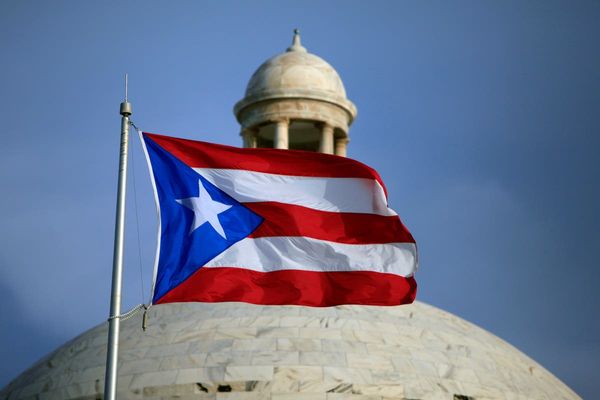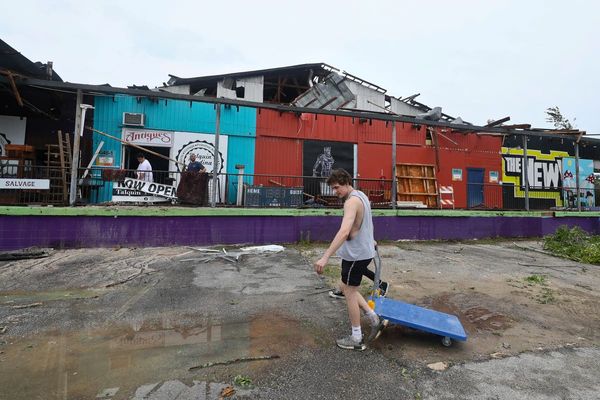
After Dominican President Luis Abinader coasted into a second term over the weekend, he promised in a nationalistic speech that “the best is yet to come.”
But as one of the region's most popular leaders spoke of economic prosperity and constitutional reforms, he notably left one thing out: the crisis in neighboring Haiti.
The Dominican Republic has long taken a hard-line stance with Haitian migrants, but harsh crackdowns have increased in recent years as Haiti's spiraling gang violence drives people to flee.
Analysts like Michael Shifter, a senior fellow at the Inter-American Dialogue, say Abinader has used the crisis as a political tool to “play on people’s fears.”
"Most Dominicans overwhelmingly believe that Abinader has done a good job. ... They're not prepared to take a risk on somebody else," Shifter said. “His very hard-line, nationalistic posture on Haiti, while it's not the only reason he won, it has lifted and cemented his political support.”
Now, as Haiti’s transitional government attempts to establish order and Abinader enters another four years in power, the question remains: What comes next for the neighbors? Some hope Abinader will soften his stance.
The Dominican Republic shares the island of Hispaniola with Haiti, which has descended into chaos and gang warfare since the 2021 assassination of President Jovenel Moïse. Abinader's government has built a wall along its 250-mile border with Haiti and deported at least 175,000 Haitians fleeing crisis last year alone. They included unaccompanied minors and other vulnerable populations.
The crackdown has brought accusations from human rights groups that say Abinader’s policies are racist and in violation of international law. When Volker Türk, the United Nations high commissioner for human rights, asked Abinader to suspend deportations due to high rates of violence and sexual abuse against civilians in Haiti, the president refused.
“Our catch phrase from now on will be: Either we fight together to save Haiti, or we will fight alone to protect the Dominican Republic,” Abinader said in February.
In his next four years in office, Abinader has promised to finish the border wall, strengthen the economy and root out the corruption that has long plagued the Caribbean country.
Voters like Rafaela Tejada, a 67-year-old retired accountant from the border city of Dajabón, told The Associated Press she voted for Abinader because she wanted him to continue his hard-line policies.
“For me, that's the number one issue the president must focus on. Otherwise, we will soon be left without a country,” she said.
But now that the election is over, Shifter said Abinader not directly mentioning Haiti in his victory speech might be a sign that he will use “less aggressive” rhetoric toward Haitians.
Haiti is going through a political transition. After Prime Minister Ariel Henry was effectively forced to resign this year amid a dramatic surge in gang violence and international pressure, an array of people have jostled for a chance to lead Haiti. The country also awaits the imminent arrival of a Kenyan police force as part of a U.N.-backed deployment to fight gangs strangling the capital of Port-au-Prince.
While transition has been chaotic, a political change in Haiti may open the door to dialogue with the Dominican Republic, which international leaders seek.
“I think the temperature will go down a little bit,” Shifter said. “If Haiti stabilizes a bit, I could imagine there being talks trying to figure out how to work together. ... There would be an incentive for Abinader to do that to gain the goodwill of the international community and the United States.”
But he doubts Abinader will abandon his tough stance on migrants. Many don't share the hope that Abinader will soften his tone.
William Charpantier Blanco, head of the National Committee for Migrants and Refugees in the Dominican Republic capital of Santo Domingo, said in past months his organization has seen rising “hate speech” against Haitians as top candidates for president “coincided” in their stances on migration.
Authorities have deported Haitians who have documents to legally be in the Dominican Republic or have sought to renew their visas.
“We see no hope in the re-election of Abinader,” Blanco said. “The fear is that everything will continue. Migrants won't be able to go out in the street or work. ... Many have had to cross the border to live here, not because it's paradise, but because Haiti offers them absolutely nothing.”







